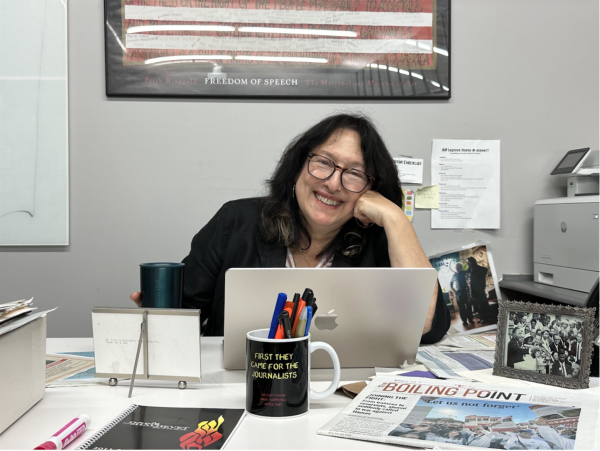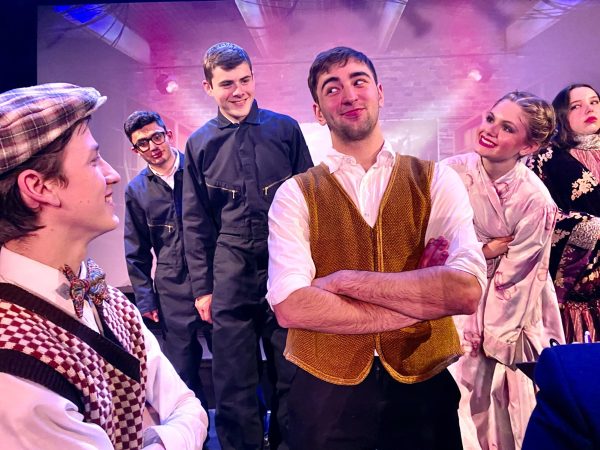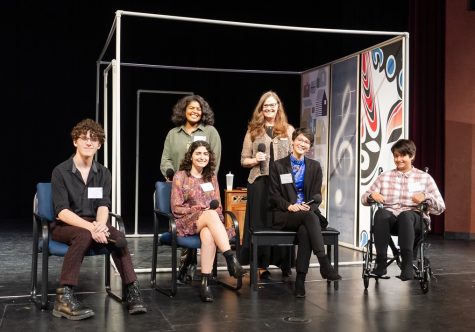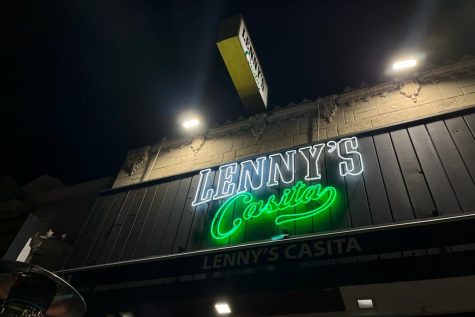REVIEW: Sliding doors, sliding stereotypes in Season 4 premiere of ‘Broad City’
Two explicitly Jewish girls are central to the story. New episodes go up Tuesday nights on Comedy Central, while previous seasons can be seen on Hulu.
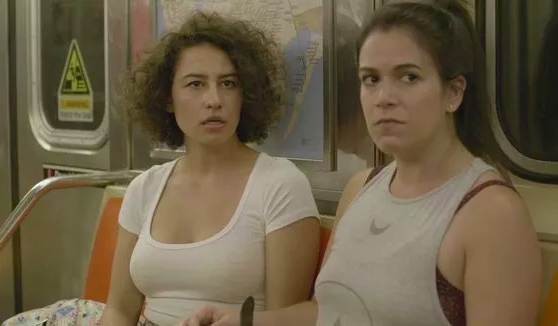
FRIENDSHIP: The Comedy Central show just premiered its fourth season. The show usually follows Abbi and Ilana’s New York City antics, this episode shows how the iconic duo met.
It’s nothing new in Hollywood for Jews or Jewish culture to be the object of comedy, as in bar mitzvahs or men wearing peyot used as a demeaning punchline. But in the first episode of Season Four of Broad City, Judaism was finally not the punchline, but the substance of the season’s debut episode.
The premier episode of the season, which aired last Tuesday on Comedy Central, is a double-view flashback that shows viewers how the two main characters, Abbi Abrams (Abbi Jacobson) and Ilana Wexler (Ilana Glazer), met. Ilana uses her Metro card to swipe Abbi into the New York subway when Abbi’s Metro card does not work, and the two make the ride. After Abbi thanks Ilana, they experience their days separately mostly but then run into each other and become friends at the end. Then, there is a second reality where the two do not make the subway.
In the one where they do make their ride, after Abbi thanks Ilana, they go about their days separately, but then run into each other and become friends at the end of the episode. The viewer of Season 4 can now see what Abbi and Ilana’s lives were like without each other, which was pretty gloomy.
Longtime viewers of the first three seasons — on Hulu — know their friendship well. Abbi is a pushover while Ilana is pushy; Abbi is an aspiring artist working her way up from janitor to trainer at a trendy New York City gym, while Ilana hangs by a thread at her sales job. Ilana is a hedonist who can’t do monogamy, while Abbi is single for most of the show but copes with her chronic loneliness with frequent visits to Bed, Bath and Beyond (their 20 percent off coupons never expire).
In this first episode, Ilana is living in an NYU suite with three apparently WASP-y roommates, all of whom she calls Madison. She walks in on the Madisons having a suite meeting (suite-ing) without her, since the meeting is about their mutual disdain for Ilana. They talk to each other to explain the situation calling one another by their full names, such as “Jessica Merkel-Keller” and “Parker Luxton,” names that ring of all-American convention. The three have naturally thin, pin-straight hair adorned in neutral-colored headbands; they wear high-cut blouses and they speak in a condescendingly polite tone.
This mimics the more common caricaturing of Jews — bankers and lawyers named Chaim Goldberg, bar mitzvah boys called Shmuli, doctors with big noses and nasal voices. So the show is stereotyping, but it is “reverse stereotyping,” thus directly redressing anti-Semitism. It’s similar to the recent trend of white-people jokes in response to centuries of demeaning jokes about black people.
Among the suitemates’ many complaints about Ilana, one is prefaced by their saying, “We know this one is just mean,” and continues, “But when your hair is curly, it looks like — “ and then it is compared to hair found elsewhere. Ilana calls the girl who says this a five-letter word starting with “b,” but in the same breathe surrenders, “But I’ll go over it with the iron again.” She stomps off in defeat as the three other girls look elatedly at one another, exclaiming, “Good job.”
This scene is filmed using a technique where two characters facing each other are filmed in separate shots, highlighting the metaphorical and physical contrast between the three roommates and Ilana. While the hair remark derides the stereotypical Jew-fro hairstyle, the show is really parodying those who mock Jewish women for thick, curly hair.
Also during this encounter, Ilana declares she contributes “a lot of culture” to the suite. She also uses over-the-top body language and hand gesturing throughout the discussion, while her likely seventh-generation-American counterparts sit or stand straight and speak with their hands clasped calmly on top of their laps.
Meanwhile, in the alternate reality where Ilana and Abbi don’t get into the subway on time, they spend the whole day together. The two are chatting on a park bench when the sprinklers go off, ruining Ilana’s hair-straightening efforts. Instantly a wet curly mop, Abbi responds, “No, it looks so good like that. Why do you straighten it?”
Ilana retorts “‘Cause I look like a true Jew if I don’t straighten it.”
“It’s not necessarily a bad thing,” Abbi shrugs. Ilana says Abbi just wouldn’t understand, but then Abbi reveals that she, too, is Jewish. Though Abbi doesn’t go through the agony of straightening a Jew-fro everyday, Ilana is inspired by the comment and decides to wear it curly everyday from then on.
In the reality where Ilana is insulted by her roommates, Abbi and Ilana have gone their separate ways after making the subway. When they reconvene at the end of the episode Ilana tells Abbi she loves her hair, which is choppy due to a bad hair day.
Together, the two parallel incidents illustrate the show’s enduring theme of embracing imperfection and the unconditional love and acceptance of true friendship.
Of course the two different scenes are comedic — the show airs on Comedy Central after all. But they do an excellent job of painting what it is like to be a loud and curly-haired Jewess in a world where blonde spaghetti hair is idealized. While most shows use loud body language and curly hair as negative stereotypes to ridicule Jews, Broad City not only welcomes those two traits but scoffs at their opposites.
Throughout, the show’s script does not mock Ilana for her Jewish attributes – it embraces them as shown in these two memorable scenes. Most importantly, the two main characters are the writers of the show, and Jewish themselves in real life. Their experience and comportment seem organic, and that’s probably because they are.
Anti-semitic stereotypes are not the only ones the episode addresses. Like every other episode of the series, this episode of Broad City offers a wide array of socio-political humor. For example, when Ilana is alone on the subway, she leans in to watch African-American breakdancers on the train, and gets kicked in the face in the process. One of the men offers her all the money his group has made that day, to which she replies (assuming he is of a lower socio-economic class) that she is just a “silly, upper-middle class NYU [epithet], so I wouldn’t take any money from you.” The man reveals he also goes to NYU — the prestigious Tisch School of the Arts, in fact. “We all do,” he says, pointing to his four dancing partners. Upon learning this, Ilana takes the $20.
The title “Sliding Doors” is a nod to the 1998 movie Sliding Doors, which was about a woman named Helen (Gwyneth Paltrow) who either misses or makes her train. The film alternates between the two trajectories of her life depending on whether she misses it or not. When she makes the ride, her life sucks. But when she does not, her life turns out perfectly.
In the first episode of Broad City’s fourth season, the alternate episode where the two spend the whole day together upon missing their train seems like the right one. It explains a lot of the backstory to the first three seasons — Abbi’s obnoxious squatter roommate, her tattoo, why Ilana’s hair is worn curly and many more hallmarks of the show’s plot and characters. Why this is not the true reality is made clear by a shocking twist in the ending.
In the world where they do make the train, on the other hand, most of their day is horribly separated, and they gladly run into each other at the end of the day. This turns out to be the right story after all.
The fact that the right reality is the one where they have isolated, miserable days for most of that universe until they run into each other ties together the knot that rests at the center of the series — the idea that some friendships are so powerful they can change a person’s entire life. The real world is not about everything happening perfectly — missing the subway with someone and then instantly becoming best friends. It’s about separation, loneliness and lack of identity, up until you meet someone who, gradually, makes those things a bit more endurable.
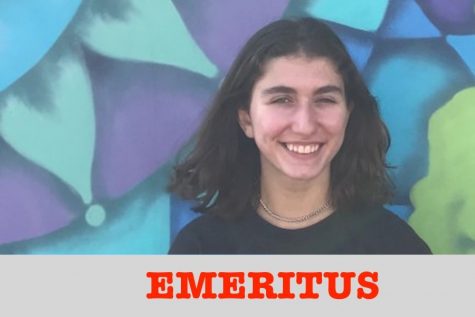
Hannah Jannol was Editor-in-Chief of the Boiling Point during the 2017-2018 school year. Since then, she has attended The New School and written for their HerCampus chapter; edited obituaries for The Trace; written poetry for Eleven and a Half literary magazine, and run Instagram and Twitter for Uptown Stories. Her favorite parts of being on Boiling Point were production night and writing long-form features stories, many of which won awards from CSPA, Quill & Scroll and the American Jewish Press Association.


